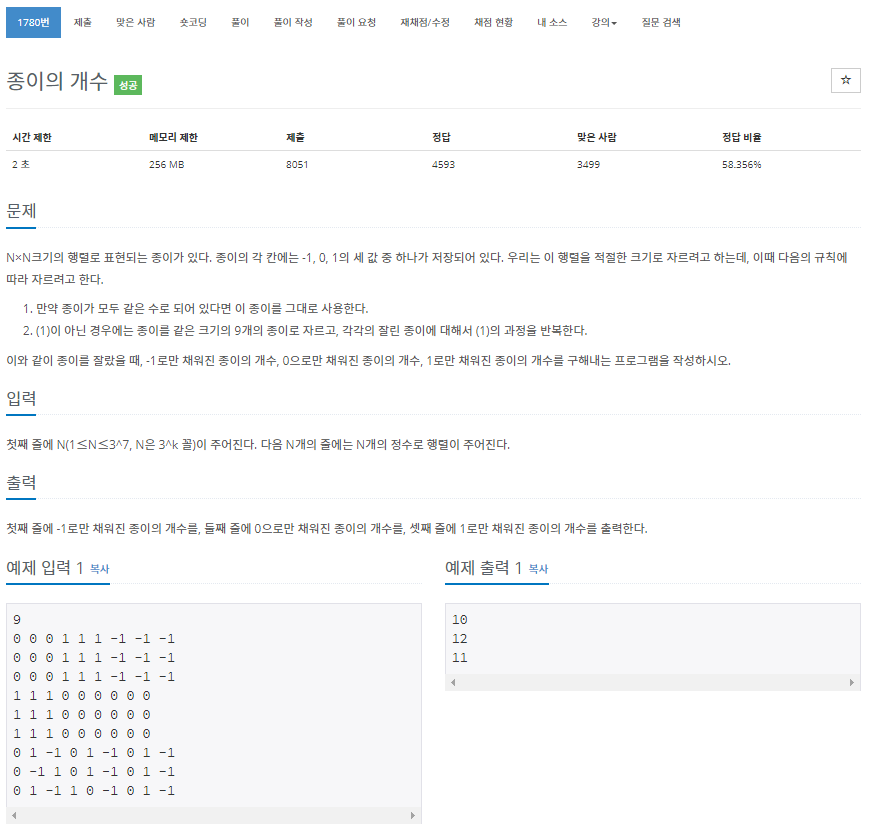알고리즘 풀이(JAVA) - 백준 알고리즘_1780(종이의 개수)
By on October 21, 2019
문제
문제 링크 : https://www.acmicpc.net/problem/1780

풀이
-
앞선 쿼드 트리 문제는 배열을 반으로 계속 잘라 가며 숫자를 비교 했다면 이 문제는 배열을 1/3 로 잘라가면서 비교를 하는 방식이다. 쿼드 트리의 이해와 배열의 이해가 있으면 쉽게 풀이가 가능 하다.
- 종이의 갯수을 카운트 하기 위한 3개의 int 변수 선언(int minus, zero, one)
- 종이를 재귀 처리할 cut(int[][] num) 메소드 생성
- int[][] num 배열의 숫자를 체크 해서(checkPaper(int[][] num)) 동일한 숫자 이면 탐색 종료
- 동일한 숫자가 아닐 경우 9개의 칸으로 잘라서 다시 재귀 처리함.(2중 반복문)
소스
- 종이의 갯수(1780)
package algorithm;
import java.io.BufferedReader;
import java.io.IOException;
import java.io.InputStreamReader;
public class Baekjoon_1780 {
private static int minus = 0;
private static int zero = 0;
private static int one = 0;
public static void main(String[] args){
BufferedReader reader = new BufferedReader(new InputStreamReader(System.in));
try{
int N = Integer.parseInt(reader.readLine());
int[][] paper = readData(reader, N);
cut(paper);
System.out.println(minus);
System.out.println(zero);
System.out.println(one);
}catch(Exception e){
e.printStackTrace();
}
}
private static int[][] readData(BufferedReader reader, int N) throws IOException {
int[][] movie = new int[N][N];
for(int i = 0; i < N; i++) {
String[] readStr = reader.readLine().split(" ");
for(int j = 0; j < N; j++) {
movie[i][j] = Integer.parseInt(readStr[j]);
}
}
return movie;
}
private static void cut(int[][] num){
if(checkPaper(num)) {
return;
}else {
for (int i = 0; i < 3; i++) {
int xS = i * num.length / 3;
int xE = (i + 1) * num.length / 3;
for (int j = 0; j < 3; j++) {
int yS = j * num.length / 3;
int yE = (j + 1) * num.length / 3;
cut(cutPaper(num, xS, xE, yS, yE));
}
}
}
}
private static int[][] cutPaper(int[][] num, int xS, int xE, int yS, int yE) {
int i = 0;
int j = 0;
int[][] tmp = new int[num.length/3][num.length/3];
for(int x = xS; x < xE; x++) {
for (int y = yS; y < yE; y++) {
tmp[i][j++] = num[x][y];
}
i++;
j = 0;
}
return tmp;
}
private static boolean checkPaper(int[][] num) {
int[] numCnt = new int[3];
for(int i = 0; i < num.length; i++) {
for (int j = 0; j < num.length; j++) {
if(num[i][j] == -1) {
numCnt[0] += 1;
}else if(num[i][j] == 0) {
numCnt[1] += 1;
}else {
numCnt[2] += 1;
}
}
}
if(isNotSameNumber(numCnt)) {
return false;
}else {
countNumbers(numCnt);
return true;
}
}
private static boolean isNotSameNumber(int[] numCnt) {
if(!isMinus(numCnt) && !isZero(numCnt) && !isOne(numCnt)) {
return true;
}
return false;
}
private static void countNumbers(int[] numCnt) {
if(isMinus(numCnt)) {
minus += 1;
}
if(isZero(numCnt)) {
zero += 1;
}
if(isOne(numCnt)) {
one += 1;
}
}
private static boolean isOne(int[] numCnt) {
return numCnt[0] == 0 && numCnt[1] == 0 && numCnt[2] > 0;
}
private static boolean isZero(int[] numCnt) {
return numCnt[0] == 0 && numCnt[1] > 0 && numCnt[2] == 0;
}
private static boolean isMinus(int[] numCnt) {
return numCnt[0] > 0 && numCnt[1] == 0 && numCnt[2] == 0;
}
}